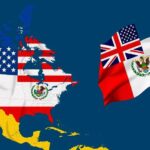Trump Announces 25% Tariffs on Canadian and Mexican Imports Beginning February 1
President Trump plans to impose a 25% tariff on imports from Canada and Mexico starting February 1. He cited the goals of curbing undocumented immigration and drug trafficking. Additionally, he signaled possible new tariffs on China, attributing part of the opioid crisis to fentanyl from the country. Both Canada and Mexico are preparing to respond to these tariffs accordingly.
In a recent announcement, President Donald Trump affirmed his intent to implement a 25% tariff on imports from Canada and Mexico starting on February 1st. While the specifics about whether oil from these countries will be included remain undecided, the President clarified that these tariffs aim to combat undocumented immigration and drug trafficking across U.S. borders, as well as address trade deficits. During his address, he also indicated potential new tariffs on China, attributing the opioid crisis to fentanyl imports from the nation.
President Trump elaborated that China would likewise be subjected to tariffs due to its contribution to the fentanyl crisis impacting the United States, describing it as a factor resulting in substantial fatalities. This follows his earlier campaign promises of imposing tariffs as high as 60% on Chinese goods, although he has postponed immediate actions until further studies are conducted by his administration.
The international context of these tariffs is significant, as previous tariffs imposed during Trump’s first term have led to a stagnation in U.S. imports from China since 2018. In response to tariffs, Canada and Mexico are preparing to enact their own countermeasures while affirming their commitment to addressing U.S. concerns regarding border security and drug trafficking.
Recently, various global officials, including a Chinese Vice Premier, have called for collaborative solutions to reduce trade tensions, emphasizing the importance of expanding imports. The concept of tariffs implies elevating the costs of foreign goods, encouraging consumers to favor domestically produced items, thereby allegedly benefiting the national economy.
The announcement of tariffs by President Trump reflects ongoing economic and political strategies aimed at deterring illegal immigration and drug problems while addressing the U.S. trade balance with neighboring countries. Tariffs serve as a tool to protect local industries by imposing taxes on imported goods, which can influence consumer behavior and market conditions. The interconnectedness of global trade and the repercussions of protective measures are pivotal elements in national economic policies, particularly for the U.S., Canada, and Mexico.
In conclusion, President Trump’s declaration to institute 25% tariffs on Canadian and Mexican imports signals a firm stance on border security and trade deficits. The potential inclusion of tariffs on Chinese goods further signifies a robust approach towards international trade issues, particularly regarding fentanyl. As nations prepare for possible economic repercussions, the intricate balance between domestic interests and global relations continues to define U.S. trade policy under the current administration.
Original Source: www.bbc.com








Post Comment